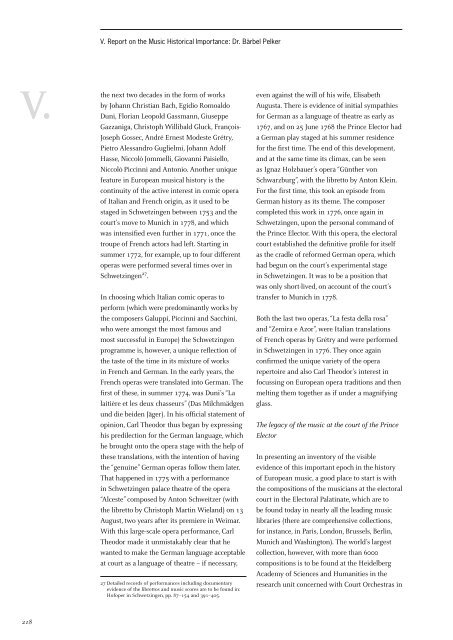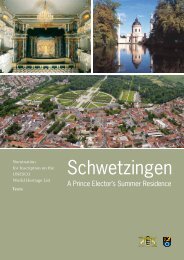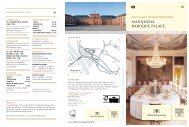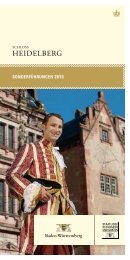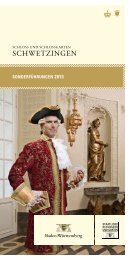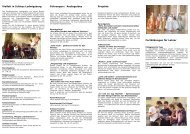3. - Schlösser-Magazin
3. - Schlösser-Magazin
3. - Schlösser-Magazin
You also want an ePaper? Increase the reach of your titles
YUMPU automatically turns print PDFs into web optimized ePapers that Google loves.
V.<br />
218<br />
V. Report on the Music Historical Importance: Dr. Bärbel Pelker<br />
the next two decades in the form of works<br />
by Johann Christian Bach, Egidio Romoaldo<br />
Duni, Florian Leopold Gassmann, Giuseppe<br />
Gazzaniga, Christoph Willibald Gluck, François-<br />
Joseph Gossec, André Ernest Modeste Grétry,<br />
Pietro Alessandro Guglielmi, Johann Adolf<br />
Hasse, Niccolò Jommelli, Giovanni Paisiello,<br />
Niccolò Piccinni and Antonio. Another unique<br />
feature in European musical history is the<br />
continuity of the active interest in comic opera<br />
of Italian and French origin, as it used to be<br />
staged in Schwetzingen between 1753 and the<br />
court’s move to Munich in 1778, and which<br />
was intensified even further in 1771, once the<br />
troupe of French actors had left. Starting in<br />
summer 1772, for example, up to four different<br />
operas were performed several times over in<br />
Schwetzingen 27 .<br />
In choosing which Italian comic operas to<br />
perform (which were predominantly works by<br />
the composers Galuppi, Piccinni and Sacchini,<br />
who were amongst the most famous and<br />
most successful in Europe) the Schwetzingen<br />
programme is, however, a unique reflection of<br />
the taste of the time in its mixture of works<br />
in French and German. In the early years, the<br />
French operas were translated into German. The<br />
first of these, in summer 1774, was Duni’s “La<br />
laitière et les deux chasseurs” (Das Milchmädgen<br />
und die beiden Jäger). In his official statement of<br />
opinion, Carl Theodor thus began by expressing<br />
his predilection for the German language, which<br />
he brought onto the opera stage with the help of<br />
these translations, with the intention of having<br />
the “genuine” German operas follow them later.<br />
That happened in 1775 with a performance<br />
in Schwetzingen palace theatre of the opera<br />
“Alceste” composed by Anton Schweitzer (with<br />
the libretto by Christoph Martin Wieland) on 13<br />
August, two years after its premiere in Weimar.<br />
With this large-scale opera performance, Carl<br />
Theodor made it unmistakably clear that he<br />
wanted to make the German language acceptable<br />
at court as a language of theatre – if necessary,<br />
27 Detailed records of performances including documentary<br />
evidence of the librettos and music scores are to be found in:<br />
Hofoper in Schwetzingen, pp. 87–154 and 391–405.<br />
even against the will of his wife, Elisabeth<br />
Augusta. There is evidence of initial sympathies<br />
for German as a language of theatre as early as<br />
1767, and on 25 June 1768 the Prince Elector had<br />
a German play staged at his summer residence<br />
for the first time. The end of this development,<br />
and at the same time its climax, can be seen<br />
as Ignaz Holzbauer’s opera “Günther von<br />
Schwarzburg”, with the libretto by Anton Klein.<br />
For the first time, this took an episode from<br />
German history as its theme. The composer<br />
completed this work in 1776, once again in<br />
Schwetzingen, upon the personal command of<br />
the Prince Elector. With this opera, the electoral<br />
court established the definitive profile for itself<br />
as the cradle of reformed German opera, which<br />
had begun on the court’s experimental stage<br />
in Schwetzingen. It was to be a position that<br />
was only short-lived, on account of the court’s<br />
transfer to Munich in 1778.<br />
Both the last two operas, “La festa della rosa”<br />
and “Zemira e Azor”, were Italian translations<br />
of French operas by Grétry and were performed<br />
in Schwetzingen in 1776. They once again<br />
confirmed the unique variety of the opera<br />
repertoire and also Carl Theodor’s interest in<br />
focussing on European opera traditions and then<br />
melting them together as if under a magnifying<br />
glass.<br />
The legacy of the music at the court of the Prince<br />
Elector<br />
In presenting an inventory of the visible<br />
evidence of this important epoch in the history<br />
of European music, a good place to start is with<br />
the compositions of the musicians at the electoral<br />
court in the Electoral Palatinate, which are to<br />
be found today in nearly all the leading music<br />
libraries (there are comprehensive collections,<br />
for instance, in Paris, London, Brussels, Berlin,<br />
Munich and Washington). The world’s largest<br />
collection, however, with more than 6000<br />
compositions is to be found at the Heidelberg<br />
Academy of Sciences and Humanities in the<br />
research unit concerned with Court Orchestras in


